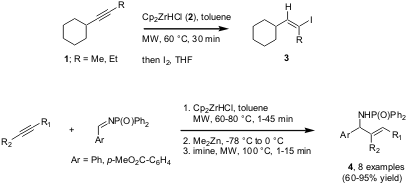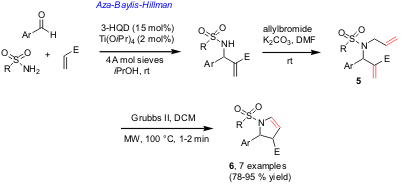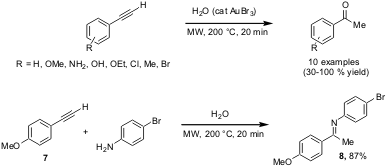Hydrozirconation is a mild method for the selective preparation of functionalized organometallics and its compatibility with a range of common protecting groups represents a considerable advantage of these species over traditional organometallic reagents. The group of Peter Wipf at the University of Pittsburgh recently reported (Org. Biomol. PMID:35850484 Chem. 2004, 2, 443.DOI: 10.1039/b316741k)that the hydrozirconation of alkynes (e.g. 69812-51-7 manufacturer 1) with zirconocene hydrochloride (2) can be greatly accelerated by microwave irradiation. A synthetically useful one-pot method for the preparation of allylic amides 4 was elaborated where an alkyne was first hydrozirconated by microwave irradiation, followed by rapid addition of imines in the presence of dimethyl zinc. Josiphos SL-J009-1 Pd G3 supplier

Ring-Closing Metathesis Reaction
Daniela Balan and Hans Adolfsson of Stockholm University have demonstrated (Tetrahedron Lett. 2004, 45, 3089.DOI: 10.1016/j.tetlet.2004.02.100)that functionalized 2,5-dihydropyrroles can be obtained by microwave-mediated ruthenium-catalyzed ring-closing metathesis (RCM). The required bis-olefin precursors 5 were conveniently obtained from aza-Baylis-Hillman adducts. Microwave irradiation for 1-2 min at 100 °C of a dilute solution of the diene with 5 mol% Grubbs II catalyst in dichloromethane produces the desired pyrroles 6 in high yield.

Hydration of Alkynes in Superheated Water
Anil Vasudevan and Mary K. Verzal at Abbott Laboratories have found (Synlett2004, 631.DOI: 10.1055/s-2004-817749)that terminal acetylenes can be hydrated under neutral, metal-free conditions using water as solvent. While typically this reaction requires a catalyst such as AuBr3, employing microwave-irradiated superheated water allowed this chemistry to proceed without any catalyst in distilled water. Extension of this methodology led to a one-pot conversion of alkynes to imines (hydroamination, e.g. 7 to 8).

Nucleophilic Aromatic Substitution
A recent report by Amy Takvorian and Andy Combs of Incyte Corporation (J. Comb. Chem. 2004, 6, 171.DOI: 10.1021/cc0340628)discloses the rapid synthesis of 2-amino-substituted purines by rapid, microwave-assisted nucleophilic aromatic substitution (SN2Ar). Importantly, the authors describe the use of small scale reaction vessels (0.2 mL) for optimization of reaction conditions under optimal reaction concentrations.
